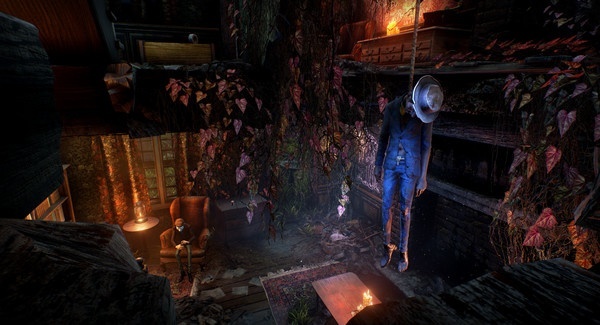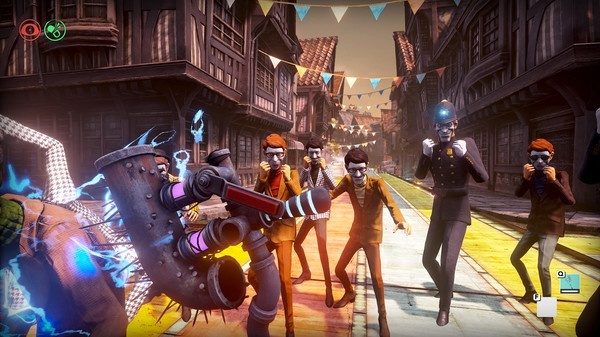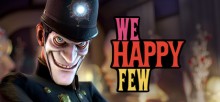We Happy Few (PC) Review
By Chris Leebody  28.10.2018
28.10.2018

Like many before, Compulsion Games - developer of equally retro-inspired 2013 platformer Contrast - opted to launch its latest project via Kickstarter back in June 2015 and it's safe to say that development has been far from boring. By 4th July of that year, the funding goal was achieved and shortly broken as it soared and development started shortly after. However, it was soon clear as the months dragged on that the original vision of a modest indie title was not going to cut it; the focus on pure survival being replaced by a more structured narrative approach inspired by the dystopian fiction of Orwell and others, an alternative vision of post-war Britain. Detailed coverage and a raft of awards at E3 2016 ensured that We Happy Few certainly had a captive audience and a growing reputation. Even as release day dawned in August, the dramatic development road still had a twist to turn with a rocky launch and some significant debate about the approach of the game. With that said, a quick patch to fix the performance issues was promptly delivered and now Cubed3 is going to step into this drug-fuelled police-state, deciding whether We Happy Few is 'joy' or despair.
Imagine for a moment that the course of world events was altered, that Britain surrendered to the Nazis and was invaded. Imagine the type of society that this would have shaped. We Happy Few imagines this, envisaging a country so riddled with suspicion and fear that an authoritarian regime has taken control and keeps its population hooked on a mood-enhancing drug known as 'joy.' It is an interesting scenario to picture and one that has not been explored too often in gaming.
The abiding thought, however, coming away from We Happy Few, is that this is an experience that suffers from a lack of focus in trying to match the lofty ambitions promised in the original vision. The world on display is one of a crumbling society having taken the brunt of war and a town, Wellington Wells, which has made a devastating error in judgement and is trying to escape its past. Sadly, not only is the town metaphorically crumbling, but the experience is marred by technical 'crumbling,' with choppy frame-rates and generally brain-dead AI.

Compulsion Games positions We Happy Few as a bit of a sandbox experience with various aspects of survival gameplay and procedural generation. As mentioned above, however, this approach seems at odds with then building the narrative, centred round three of the town's residents and exploring their past. It feels like it would have been better to have either decided to make a linear but fully formed story campaign, or else to have made a true survival affair. As it is, the resource management of hunger, thirst, sleep, and 'joy' consumption, ends up being mindless busywork, which ultimately doesn't ever feel detrimental enough to bother paying attention to. Crafting is in place but there is never a point in time where it feels like resources are an issue or where a weapon available isn't around the corner.
The basis of the story here is an interesting one, with Arthur, Sally, and Ollie all being very likeable characters. Where the world-building really shines is in the small passive things that take a more novelistic approach, such as the war maps on the wall or the patriotic propaganda posters, subverted from their real life versions and the many journal entries.

They give a glimpse into this altered universe with some of the sights and sounds being genuinely disturbing. The shelled, collapsed houses filled with the toys and games of children, or records still playing with graffiti written with the words of madness, mean that in one breath We Happy Few goes from political satire to horror survival in this nightmarish land. The fusing of genres and organic storytelling is impressive. The aesthetic of the world is pretty interesting as well. It has a familiar allusion to Bioshock, in that there is a real imaginative look to all the futuristic technology, as well as the cartoonish look of the citizens and smiling masks of the brutal police in stark contrast to the devastated town and the murderous actions of the state.
The disappointing thing is that, by and large, although the context of the story is interesting in itself, the actual act of progressing through the story ends up lacking a lot of vision. Most of the quests boil down to fetching one thing or another, all the while running what seems like a marathon around a very uninteresting open-world, filled with endless fields.
This seems like a consequence of the "procedural" aspect and this is where the approach of Compulsion Games has to be questioned slightly. This is an interesting narrative and it may have been better served being approached in a more contained and linear plot. Having the police patrolling the landscape at night and having to avoid them isn't fun; it just ends up being annoying.

It isn't helped in the execution of some basic gameplay mechanics, particularly the AI. Even after a couple of patches, it is painfully bad in terms of NPCs being oblivious to the point of not spotting a character running right in front of them. One moment the player can kill someone in the middle of the street and no one will react, and yet a misguided jump or stray hit will have literally the entire town chasing the protagonist like bloodhounds. It just feels like there is a lack of polish in the basic fundamentals, again an aspect it could be imagined would have been easier to rectify if not clutched by the open format of the experience.
The aforementioned lack of polish extends to the technical performance. The graphics in We Happy Few are decent. The art style is impressive and in parts the use of light and textures do the world justice. However, they are not impressive enough to warrant the unpredictable and choppy frame-rate, especially at certain parts indoors where there is entirely no justification for it.
It must be said that where the game does shine is in the voice acting, which has a really professional quality. The character voices all lend a great deal of charm to them and whilst demonstrating the demented happiness of some people, also manage to portray the glum depression of other citizens. The dialogue itself is also well written, which in a way just makes it more irritating that the story quests didn't make better use of this.

Cubed3 Rating
Good
We Happy Few is a warning to any developer about the vision and ambition of a game overtaking the ability of the team to deliver all aspects of it. It is also a warning of the perils of trying to cram too many opposing gameplay mechanics into the one package. There is a really good experience in here. The context of the world and the basis of the story have so much potential, exploring many ideas that are often too overlooked in gaming. The moments of passive storytelling that is discovered, just by reading the journals or newspapers, are magical and interesting. The disappointing thing is that this magic is buried under too many bland fetch quests and too many technical problems. There is a roadmap of future content being developed, so maybe this can change, however… hopefully!

![]() 6/10
6/10
![]() 0
(0 Votes)
0
(0 Votes)
 Out now
Out now  Out now
Out now  None
None  Out now
Out now Comments
Comments are currently disabled

 Sign In
Sign In Game Details
Game Details Subscribe to this topic
Subscribe to this topic Features
Features





 Top
Top

